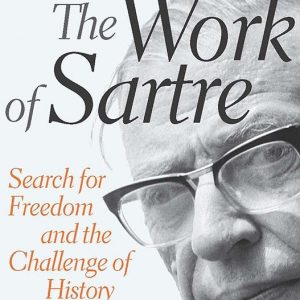Marx & Philosophy Review of Books » Reviews » 2013
István Mészáros, The Work of Sartre: Search for Freedom and the Challenge of History, Monthly Review Press, New York, 2012. 380pp., $28.95 / £25 pb
ISBN 9781583672921
Reviewed by A F Pomeroy
The 2012 release, The Work of Sartre: Search for Freedom and the Challenge of History, delivers the long-awaited final section of Mészáros’ 1979 study on Sartre’s work. Originally intended to constitute a second volume, the analysis of Sartre’s conception of history now serves to expand and complete the original text.
The stated purpose of this new edition is to fill a political lacuna inadequately addressed by postmodernism and post-structuralism, to resurrect from its bourgeois determinations the dignity of the notion of individual responsibility championed by Sartre, to pay the debt owed to Sartre by Marxists. In a time when “the future seems to be fatefully barred by capitalism’s deepening crisis”, a retrieval of the power of radical negation seems necessary so that we can admit with Sartre that “a barred future is still a future” (11).
It speaks to the strength of Mészáros’ analysis of Sartre that the first two parts, originally published as The Work of Sartre: Search for Freedom, have withstood the test of time so well. They merit review, even by those who have previously read the text, as they provide needed context for the newly added third part. However, it should be noted that Part Three reproduces material already published in Section 6 of Mészáros’ The Dialectic of Structure and History (volume 2 of Social Structure and Forms of Consciousness).
Part One: The examination of the unity of Sartre’s life and work is focused through the lens of the problematic of the writer’s project. The question of how the contingencies of the lived social framework can be transformed into the necessity embodied in the work frames both Sartre’s social-political work of engagement, and his philosophical-literary production. What is the subject such that objectivity becomes lived? How is it that there is a “singularization of the work by the man and the universalization of the man by the work?” (44, as quoted from Sartre).
According to Mészáros, the strictly discursive form of most philosophical presentation is inadequate for Sartre to fully explore the dynamic relations of the human project and original choice as they play out in situation and through conflicts (49). Therefore Sartre supplements philosophical writing with plays that allow representation of these mediations in the mythical form, and with novels that allow historical presentation of the singular universal. Most often however, Sartre opts for a fusion of discursive and representational forms: the philosophical themes appear in the plays and novels; the philosophical analyses are expressed by way of metaphorical imagery, dramatic exemplifications, and references to lived experience (52). Much to his credit, Mészáros does not limit his study to the strictly philosophical works, but integrates both the fictional and biographical novels (Flaubert and Genet) and the plays in his analyses.
The final section of Part One introduces a rough timeline outlining six periods of Sartre’s literary-philosophical development (78-80). We are warned, however, against the belief that there are definitive breaks between these stages. In fact, Mészáros maintains, the development is driven by the nature of Sartre’s initial project. Sartre’s ontological vision remains consistent throughout, and this consistency constitutes both his greatest contribution, and his greatest stumbling block (85-6)…
Read the entire review in Marx & Philosophy Review of Books

Comments are closed.